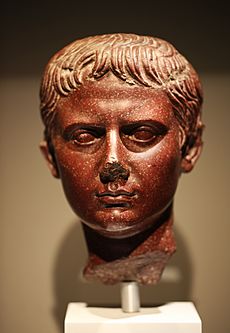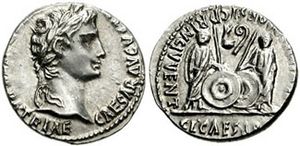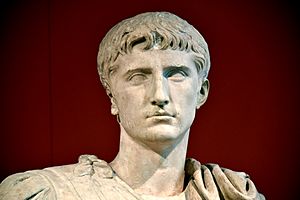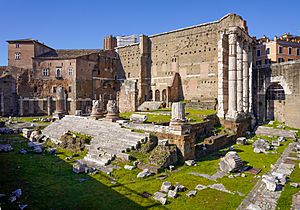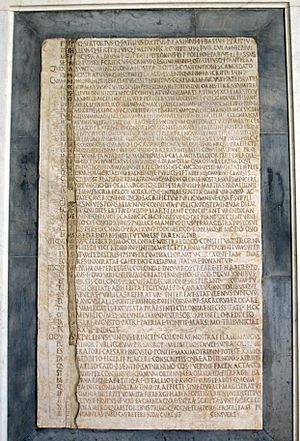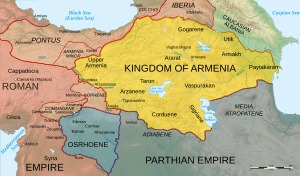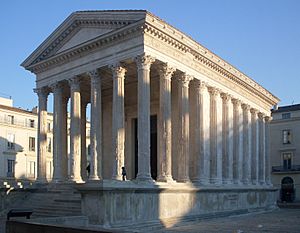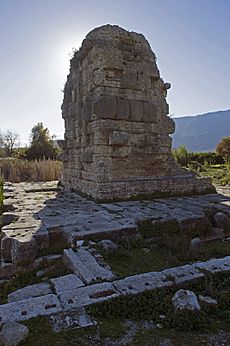Gaius Caesar facts for kids
Quick facts for kids Gaius Caesar |
|||||
|---|---|---|---|---|---|
| Consul Princeps Iuventutis |
|||||
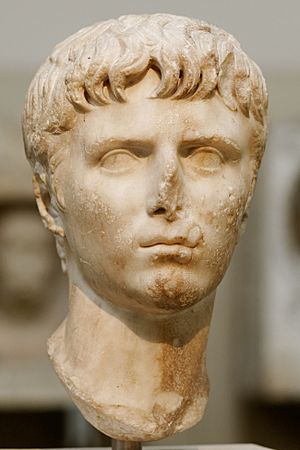
Bust of Gaius Caesar, now in the collection of the British Museum
|
|||||
| Born | Gaius Vipsanius Agrippa 20 BC Rome, Roman Empire (now Rome, Italy) |
||||
| Died | 21 February 4 AD (aged 23) Limyra, Lycia, Anatolia (now Turunçova, Antalya, Turkey) |
||||
| Burial | Mausoleum of Augustus | ||||
| Spouse | Livilla | ||||
|
|||||
| Dynasty | Julio-Claudian | ||||
| Father | Marcus Vipsanius Agrippa Augustus (adoptive) |
||||
| Mother | Julia the Elder | ||||
Gaius Caesar (born 20 BC – died 21 February 4 AD) was the grandson of the Roman emperor Augustus. He was also adopted by Augustus, along with his younger brother Lucius Caesar. This made them both heirs to the Roman Empire.
Gaius was born to Marcus Vipsanius Agrippa and Julia the Elder, who was Augustus' only daughter. Even though he was young, Gaius quickly moved up in his political career. The Roman Senate allowed him to take on important roles without first holding less powerful jobs. These jobs, like quaestor or praetor, were usually required for other senators.
In 1 BC, Gaius was put in charge of the eastern provinces. He made a peace treaty with King Phraates V of Parthia on an island in the Euphrates River. Soon after, he became a consul for the next year, 1 AD. About a year after Gaius was consul, his brother Lucius died in Massilia. Around eighteen months later, Gaius also died from an illness in Lycia. He was married to his second cousin Livilla, but they did not have any children. After Gaius and Lucius died in 4 AD, Augustus adopted his stepson, Tiberius, and his last surviving grandson, Agrippa Postumus.
Contents
Augustus's Family and Heirs
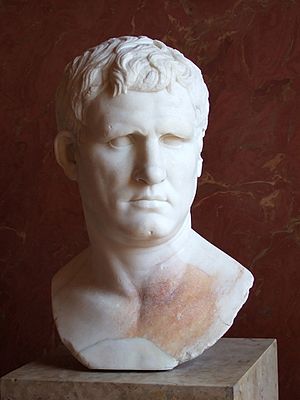
Gaius's father, Marcus Vipsanius Agrippa, was a strong supporter of Augustus. Augustus was known as "Octavius" before he became emperor. Agrippa was a key general in Augustus's armies. He led troops in important battles against Mark Antony and Sextus Pompeius.
Agrippa was trusted with managing affairs in the eastern parts of the empire. At one point, when Augustus was very sick, he even gave Agrippa his special signet ring. This showed that Agrippa might become the next ruler if Augustus died. However, Augustus got better and started to favor his nephew, Marcus Claudius Marcellus. Marcellus was only 19 years old at the time. Sadly, Marcellus died from an illness that spread through Rome that same year.
After Marcellus's death, Augustus arranged for Agrippa to marry his daughter, Julia the Elder. She had been married to Marcellus before. In 18 BC, Agrippa was given tribunicia potestas, which meant he had the power of a tribune. This power allowed him to control the Senate. Agrippa used this power to help pass important laws. He became very close to being a co-ruler with Augustus.
Gaius's Early Life
Gaius was born in Rome in 20 BC. His parents were Marcus Vipsanius Agrippa and Julia the Elder. He was part of the famous Julio-Claudian dynasty, which included all the early Roman emperors. Through his mother, he was the oldest grandson of Emperor Augustus.
Gaius was also the stepson of Tiberius, because his mother Julia married Tiberius. His sister, Agrippina the Elder, married Germanicus, making him Claudius's brother-in-law. Gaius was also the uncle of Caligula, who was Agrippina's son. The last emperor of this family line, Nero, was Gaius's great-nephew. Each year, a special sacrifice was made on Gaius's birthday.
In 17 BC, Gaius's brother Lucius was born. Augustus quickly adopted both Gaius and Lucius from their father. He named them his personal heirs. We don't know what their father thought about this adoption. Augustus started training them for government work when they were still young. He even sent them to provinces as consuls-elect. Augustus personally taught Gaius and Lucius how to read, swim, and other important skills. He even helped them learn to copy his own handwriting.
Soon after their adoption, Augustus held the fifth Ludi Saeculares (Secular Games). The adoption of the boys and these games marked a new time of peace for Rome, called the Pax Augusta.
That year, Gaius's family moved to the province of Syria. This was because Agrippa was put in charge of the eastern provinces. Four years later, in 13 BC, Gaius took part in the Trojan games. These games were held with other young noblemen at the opening of the Theatre of Marcellus. Also in 13 BC, Agrippa and Augustus returned to Rome. Augustus then sent Agrippa to Pannonia to stop a rebellion. Agrippa arrived there in the winter of 12 BC, but the people of Pannonia gave up their plans. Agrippa returned to Campania in Italy, where he became sick and died soon after.
His father's death made the question of who would rule next very important. Coins made in 13–12 BC clearly showed that Augustus planned for Gaius and Lucius to be his successors. Gaius and Lucius also owned a large country estate near Cortona.
Since their father was no longer alive to take power if the Emperor died, Augustus had to make it clear who his chosen heirs were. To learn about military matters, Gaius went with Tiberius on a campaign against the Sicambri people in 8 BC. The year before, Tiberius's brother Drusus the Elder had died. Tiberius was then given command of Germania. He led two campaigns across the Rhine River in 8 BC and 7 BC. He marched his army between the Elbe and the Rhine. He faced little resistance, except from the Sicambri. Tiberius nearly wiped out the Sicambri. He moved those who survived to the Roman side of the Rhine, where they could be watched more closely.
Gaius's Political Career
Early Steps in Politics
In 6 BC, Gaius was chosen to be a consul, even though he was very young. He was meant to become consul when he turned twenty. The next year, Augustus made him a pontifex, which was a high priest. He was also allowed to attend Senate meetings, watch public shows, and eat with senators. People all over Italy supported the young prince. Statues and writings were put up everywhere to remember that he had been named a consul at the very young age of fourteen.
The next year (5 BC), when he was old enough for military service, he put on the toga virilis, a special toga worn by adult men. Augustus then introduced him to the Senate. The Senate declared him princeps iuventutis ("leader of the youth") and sevir turmae (commander of a cavalry group). Since he was chosen as consul, he was allowed to share his opinions with the Senate. Lucius, who was three years younger, received the same honors later.
Events in the East
After King Herod of Judaea died in 4 BC, his sons Antipas and Archelaus both came to Rome. They each brought a copy of Herod's will. They wanted to argue why they should inherit their father's kingdom. Augustus, as usual, did not want to make the decision alone. He called a meeting of senators, and Gaius was included. The group decided to approve the will that Archelaus brought. This will included a large gift to Augustus and his wife Livia.
The cities of Judaea rebelled after a Roman official, Sabinus, sent soldiers to guard the large amount of money promised to the Emperor. The governor of Syria, Varus, had to bring in his legions (large groups of soldiers) from Syria to bring back order.
At the same time, King Phraates IV of Parthia had taken control of Armenia. He did this with the help of Armenian nationalists. He removed Tigranes IV, the king that Rome had put in place. Rome's power in Asia depended on Armenia being a Roman protectorate (a state controlled by Rome). Before Rome could deal with the Parthians in Armenia, it needed its Syrian soldiers. These soldiers were still busy in Palestine. To free them up, the Kingdom of Judaea was divided among Herod the Great's sons. This helped bring stability back to the region and kept Judaea from becoming too powerful. After settling things in Judaea, the Emperor decided to send an army to Armenia. The goal was to make it a Roman protectorate again and show the eastern world that Rome controlled all land up to the Euphrates River.
Command in Asia
Journey to the East
Augustus was too old to travel to the east himself. He trusted few people to handle matters there, but he believed Gaius could do it. Gaius was a good choice because his presence showed that the imperial family was involved. Any orders or promises from him were as important as if they came from the Emperor. However, Gaius was only eighteen, so he was too young to handle such important business alone.
Before leaving for the east, Gaius and his brother Lucius were given the power to dedicate buildings. They managed the games held to celebrate the opening of the Temple of Mars Ultor on August 1, 2 BC. His youngest brother, Postumus, took part in the Trojan game with other young horsemen. During these games, 260 lions were killed in the Circus Maximus. There were also gladiator fights, a naval battle, and 36 crocodiles were killed in the Circus Flaminius.
Augustus's friends had hoped he would change his mind about sending Gaius to the east. But because of the problems there, he stuck to his plan. He sent Gaius to Syria at the beginning of 1 BC. The Emperor gave Gaius special authority as a proconsul. He also had Gaius marry his second cousin, Livilla. Livilla was the daughter of Drusus the Elder and Antonia Minor.
Because Gaius was young and didn't have much experience, the Emperor sent advisors with him. These advisors included Marcus Lollius, Publius Sulpicius Quirinus, the future historian Velleius Paterculus, Lucius Domitius Ahenobarbus (Nero's grandfather), Juba II of Numidia, and Sejanus, who would later become a powerful guard leader.
On his way to Syria, Gaius met with Tiberius, who had stopped being involved in politics and was living in Rhodes. Some historians say that Gaius was not very welcoming to Tiberius. This made Tiberius feel distant from Gaius and his advisors.
Gaius as Consul
The next year, on January 1, Gaius became consul. He was in Asia at the time, probably in Antioch. He was organizing an army to invade Armenia and talking with Phraates to reach an agreement. The Emperor did not want a full war, and the king of Parthia seemed open to peace. The talks probably moved faster because Gaius's army was in Syria, which worried Parthia. People from all over visited the young consul to make requests and show respect. This year, monuments were built for him and his brother.
Because he was young, Gaius had to rely on his companions. One of them, Lollius, took advantage of his power. He was reportedly demanding money from towns, people, and even kings. After Gaius started talks with Phraates, Lollius offered the Parthian king special deals in exchange for money.
War preparations continued into the spring and summer of 1 AD. Then, there was a big step forward in the peace talks. Phraates did not want to go to war. He agreed to leave Armenia and give up his half-brothers, who were still held by the Romans. In the second half of the year, Gaius moved his army to the Parthian border. He reached a final agreement with Phraates. Phraates gave up all claims to Armenia and all power over his half-brothers.
Around this time, Augustus traveled through Judea. He praised Gaius for not offering prayers in Jerusalem. This would have upset the Jewish people living there.
Expedition to Arabia
At some point while he was in the east, Gaius led a trip into Arabia. We don't know exactly where or why, but it was mentioned by Pliny. The term "Arabia" was used broadly by Romans. Some think Rome wanted to control the trade of incense, but this is not proven. Juba II, a former king, went with Gaius to the east. Juba wrote a book to help Gaius prepare for meeting the Arabs. Pliny says Gaius went as far as the Gulf of Aqaba. This trip definitely happened before his time in Armenia. It likely took place during his consulship.
Historian John Grainger believes Gaius was at the Gulf of Aqaba or in Nabataea. The Nabataean Kingdom later became the Roman province of Arabia. So, Gaius might have gone to Arabia to support or to control the King of Nabataea, Aretas IV. This is probably why coins continued to be made in the king's name after Gaius's consulship.
Control in Armenia
The year after his consulship, in the spring, Gaius met with Phraates by the Euphrates River. They had a feast to celebrate their peace treaty. It was here that Phraates, who was angry with Lollius, told Gaius about Lollius's secret deals. Because Lollius was taking money from kings, he lost Gaius's friendship and then took poison. Pliny says Lollius became very rich from his crimes. His granddaughter could afford jewelry worth a huge amount of money. Lollius's death was good for Tiberius. After this, Gaius agreed to Tiberius's return to Rome and back into Roman politics.
At the same time, the throne of Armenia became empty. With Augustus's permission, Gaius placed Ariobarzanes II of Atropatene on the throne. But the Romans were not the only ones interested in Armenia. The Parthians encouraged a rebellion among Armenian nationalists. A large group of rebels took over a fortress in the city of Artagira. Gaius got involved in the conflict and invaded Armenia in late August of 2 AD. He faced little serious resistance, only a few small rebellions.
On September 9, Abbadon, the rebel leader, invited Gaius into the fortress to talk. This turned out to be a trick, and Gaius was wounded in the fight. His angry officers had to carry him away. His forces quickly surrounded the city and captured the fortress after intense fighting. At first, the wound did not seem serious. He was able to finish bringing peace to Armenia, which was a fairly easy task.
By the next year (3 AD), he was very sick from his wound. He gave up his command and went to Syria. From there, he told Augustus that he no longer wanted to be involved in public life. The campaign in the east had been very hard on him. His health was poor, and his mind was not stable. At twenty-three, the young man Augustus saw as his heir had given up his chances for fame and power. He did this in a fit of sadness and fear. Augustus tried his best to cheer him up and convince him to return to Italy. But it was no use. Gaius died in a small town in Lycia on February 21, 4 AD.
After Gaius's Death
While Gaius was in Armenia, his brother Lucius had been sent by Augustus to finish his military training in Spain. While there, Lucius became sick and died on August 20, 2 AD, in Massalia, Gaul. Within 18 months, Rome's future plans were shaken. The deaths of both Gaius and Lucius, Augustus's two most favored heirs, led Augustus to adopt his stepson Tiberius and his only remaining grandson, Postumus. This happened on June 26, 4 AD.
Many honors were given to Gaius by citizens and city officials across the Empire. In Pisa, for example, it was ordered that women should perform special rites to mourn his death. Temples, public baths, and shops closed their doors as women cried sadly. To remember his short life, a special monument (a cenotaph) was built on the Limyrus River at Limyra in Lycia. After his death, the Senate voted to honor the young Caesars. They arranged for the golden spears and shields the boys had received when they became old enough for military service to be hung in the Senate House. The boxes holding their ashes were placed in the Mausoleum of Augustus. This was where their father Agrippa and other members of the imperial family were buried.
See also
 In Spanish: Cayo César para niños
In Spanish: Cayo César para niños
- Julio-Claudian family tree
Images for kids
-
Bust of Gaius' father, Marcus Vipsanius Agrippa
-
Latin inscription from the cenotaph to Gaius and Lucius Caesar in Pisa (CIL XI, 1421)
-
The Maison Carrée (French: "square house") was dedicated in Nemausus to Gaius and Lucius.


